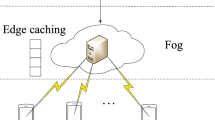Abstract
Fog Computing based Radio Access Networks are a promising paradigm for 5th Generation wireless communication technology (5G) having edge devices endowed with some caching and storage capacity, as a key component for reducing caching burden on the cloud server and providing fast access and retrieval at F-UEs in a scenario where IoT based devices requiring ultra-low latency will be used extensively. The amount of static as well as dynamic data requests generated by these real-time applications will be unpredictable and unmanageable shortly causing fronthaul congestion. In order to avoid performance degradation of F-RANs in near future, cache resource allocation strategies to increase cache hit ratio, must be redefined in a further better way. Quantum computing, on the other hand, seems to be the future for every kind of classical computing problem having non-linearity and exponential growth of computation and memory with a linear increase in Quantum bits due to its parallelism. In this paper, AI has been engaged in an attempt to enhance the caching capability in F-APs by updating caching content intelligently in quantum regime, accelerating computational speed and facilitating limited storage concerns. To validate our proposed framework, certain simulations are carried out in MATLAB. The results show an inevitable outcomes for F-RANs performance up gradation.
Access this chapter
Tax calculation will be finalised at checkout
Purchases are for personal use only
Similar content being viewed by others
References
Ku, Y.-J., Lin, D.-Y., Lee, C.-F., et al.: 5G radio access network design with the fog paradigm: confluence of communications and computing. IEEE Commun. Mag. 55, 46–52 (2017). https://doi.org/10.1109/mcom.2017.1600893
Peng, M., Wang, C., Lau, V., Poor, H.V.: Fronthaul-constrained cloud radio access networks: insights and challenges. IEEE Wirel. Commun. 22, 152–160 (2015). https://doi.org/10.1109/mwc.2015.7096298
Bonomi, F., Milito, R., Zhu, J.Z.J., Addepalli, S.: Fog computing and its role in the Internet of Things. In: MCC 2012, Helsinki, pp. 13–16. ACM (2012)
Mikhail, G., Dmitri, M., Roman, F., et al.: Cooperative radio resource management in heterogeneous cloud radio access networks. IEEE J. Mag. 3, 397–406 (2015). https://doi.org/10.1109/access.2015.2422266
Liu, J., Bai, B., Zhang, J., Letaief, K.B.: Cache placement in Fog-RANs: from centralized to distributed algorithms. IEEE Trans. Wirel. Commun. 16, 7039–7051 (2017). https://doi.org/10.1109/twc.2017.2737015
Arun, G., Mishra, V.: A review on quantum computing and communication. IEEE, Surat, India (2014)
Thaker, D., Metodi, T., Cross, A., et al.: Quantum memory hierarchies: efficient designs to match available parallelism in quantum computing. In: 33rd International Symposium on Computer Architecture (ISCA 2006), Boston, USA. IEEE (2006)
Sillanpää, M.A., Park, J.I., Simmonds, R.W.: Coherent quantum state storage and transfer between two phase qubits via a resonant cavity. Nature 449, 438–442 (2007). https://doi.org/10.1038/nature06124
Vignesh, R., Poonacha, P.G.: Quantum computer architectures: an idea whose time is not far away. In: International Conference on Computers, Communications and Systems, Kanyakumari, India. IEEE (2015)
Almudever, C.G., Lao, L., Fu, X., et al.: The engineering challenges in quantum computing. In: Design, Automation and Test in Europe Conference and Exhibition, Lausanne, Switzerland. IEEE (2017)
Peng, M., Yan, S., Zhang, K., Wang, C.: Fog-computing-based radio access networks: issues and challenges. IEEE Netw. 30, 46–53 (2016). https://doi.org/10.1109/mnet.2016.7513863
Liu, D., Chen, B., Yang, C., Molisch, A.F.: Caching at the wireless edge: design aspects, challenges, and future directions. IEEE Commun. Mag. 54, 22–28 (2016). https://doi.org/10.1109/mcom.2016.7565183
Jiang, Y., Ma, M., Bennis, M., et al.: User preference learning-based edge caching for fog radio access network. IEEE Trans. Commun. 67, 1268–1283 (2019). https://doi.org/10.1109/tcomm.2018.2880482
Wang, M., Wu, J., Li, G., et al.: Fog computing based content-aware taxonomy for caching optimization in information-centric networks. In: IEEE Conference on Computer Communications Workshop, Atlanta, USA. IEEE (2017)
Wang, X., Leng, S., Yang, K.: Social-aware edge caching in fog radio access networks. IEEE Access 5, 8492–8501 (2017). https://doi.org/10.1109/access.2017.2693440
Tandon, R., Simeone, O.: Cloud-aided wireless networks with edge caching: fundamental latency trade-offs in fog Radio Access Networks. In: International Symposium on Information Theory (ISIT), Barcelona, Spain. IEEE (2016)
Vu, T.X., Chatzinotas, S., Ottersten, B.: Edge-caching wireless networks: performance analysis and optimization. IEEE Trans. Wirel. Commun. 17, 2827–2839 (2018). https://doi.org/10.1109/twc.2018.2803816
Wang, S., Huang, X., Liu, Y., Yu, R.: CachinMobile: an energy-efficient users caching scheme for fog computing. In: IEEE/CIC International Conference on Communications in China (ICCC), Chengdu, China. IEEE (2016)
Ma, G., Wang, Z., Zhang, M., et al.: Understanding performance of edge content caching for mobile video streaming. IEEE J. Sel. Areas Commun. 35, 1076–1089 (2017). https://doi.org/10.1109/jsac.2017.2680958
Bastug, E., Bennis, M., Debbah, M.: Living on the edge: the role of proactive caching in 5G wireless networks. IEEE Commun. Mag. 52, 82–89 (2014). https://doi.org/10.1109/mcom.2014.6871674
Author information
Authors and Affiliations
Corresponding author
Editor information
Editors and Affiliations
Rights and permissions
Copyright information
© 2020 Springer Nature Singapore Pte Ltd.
About this paper
Cite this paper
Hassan, T., Khan, W.A., Ahmad, F., Rizwan, M., Rehman, R. (2020). Edge Caching Framework in Fog Based Radio Access Networks Through AI in Quantum Regime. In: Bajwa, I., Sibalija, T., Jawawi, D. (eds) Intelligent Technologies and Applications. INTAP 2019. Communications in Computer and Information Science, vol 1198. Springer, Singapore. https://doi.org/10.1007/978-981-15-5232-8_61
Download citation
DOI: https://doi.org/10.1007/978-981-15-5232-8_61
Published:
Publisher Name: Springer, Singapore
Print ISBN: 978-981-15-5231-1
Online ISBN: 978-981-15-5232-8
eBook Packages: Computer ScienceComputer Science (R0)




